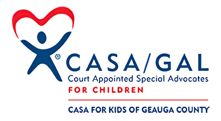
What We Do
CASA volunteers are
Court Appointed Special Advocates
Children who are victims of abuse and neglect are assigned a Court Appointed Special Advocate (CASA) or Guardian ad Litem (GAL) volunteer. These volunteers come from various backgrounds. After thorough training, the CASA is then equipped to advocate for a child's best interest in court.
A CASA volunteer is assigned by the Judge to represent a child's best interest. The CASA/GAL volunteer completes an investigation by interviewing the child, family members, and others to gather information for the Court Report that will be filed with the Court by the CASA Supervisor. The Court Report includes background information and unbiased, fact-based recommendations to assist the Judge or Magistrate in making the best decision for the child.
Geauga CASA volunteers are community members who have been rigorously screened and trained. CASA volunteers must:
Be at least 21-years-old
Pass a background check
Complete at least 32 hours of pre-service training, plus in-court observation
Accumulate 12 hours of continuing education every year
Volunteers get continued support from the Geauga CASA team and state non-profit Ohio CASA.
CASA for Kids of Geauga County FAQs
-
CASA volunteers research the child’s circumstances, determine relevant facts in a child’s case and report this information to the court. The findings and recommendations from the CASA’s investigation helps to impact the court’s decision concerning the child’s future. A CASA volunteer focuses their recommendations and actions to ensure the best interests of the child are being met. A CASA will also monitor a case—making sure that services ordered are actually provided, and that the court is informed of any new developments. Every case is unique, but a CASA volunteer often must recommend to the court whether or not a child should stay or be reunified with his or her biological parents, be placed in foster care, or be available for adoption with another family. Though the final decision always rests with the judge or magistrate, a CASA volunteer does their best to inform the court as an independent and objective voice for the child.
-
CASA or guardian ad litem (GAL) volunteers are unpaid community members who have made a commitment to advocate for abused, neglected and dependent children. Community members interested in becoming CASA/GAL volunteers must: Be 21 years old; Pass a background check; Complete at least 32 hours of pre-service training; and accumulate 12 hours of continuing education each year. Volunteers are closely screened by local programs for competence, commitment and objectivity.
-
Geauga County CASA volunteers come from all walks of life, with a variety of professional, educational and cultural backgrounds. Our program has volunteers who work both full and part time jobs, and other volunteers who are retired. Because the children served by CASA volunteers are diverse in background and need, we strive to recruit volunteers diverse in skill.
-
CASA volunteers receive thorough training. The pre-service training takes a minimum of 32 hours. Through this training volunteers learn about courtroom procedure from those in the profession— judges, lawyers, social workers and court personnel. Volunteers also learn effective advocacy techniques for children and are educated about specific topics ranging from child abuse to how to address the court with information, concerns and recommendations to support the best interest of a child. The culmination of the pre-service training is the swearing-in ceremony. Volunteers also have opportunities during the course of the year to attend in-service trainings, which focus on relevant and timely topics for the CASA volunteer. In addition, CASA volunteers are required to complete 12 hours of in-service training annually.
-
According to a number of studies, children who are assigned a CASA volunteer: Spend less time in the court system and less time in foster care than those who do not have CASA representation; are more likely to be placed in permanent homes; and receive more services than children without CASA volunteer advocacy.
-
Each case is different. When a case is initially assigned, a CASA volunteer may spend five to ten hours per week researching the case history and conducting interviews. Volunteers spend anywhere from 5 to 15 hours a month thereafter. Some cases may continue for two years or longer, and volunteers are asked to commit until a case has been closed. Because caseworker and service provider turnover can be high, often the CASA/GAL volunteer is the only consistent presence in the child’s life.


